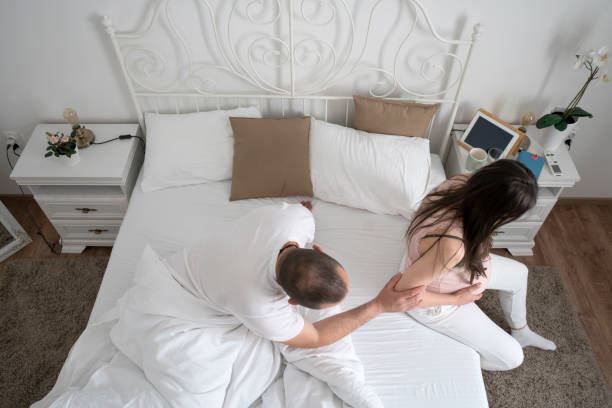Introduction

Sleep is essential to our overall well-being, providing much-needed rest and rejuvenation after a long day. However, bedtime can quickly become a struggle for those suffering from back pain. The tossing and turning, the discomfort, and the constant search for a position that offers relief can disrupt their sleep and that of their partners. You want to help someone who suffers from back pain while sleeping and is aware of their difficulties.
This partner's guide will explore strategies and techniques to support your loved one with back pain, allowing them to find much-needed rest and wake up refreshed. We will provide practical tips to improve your bedtime experience, including adjusting sleep positions and creating a sleep-friendly environment, to make it more comfortable for both of you. So, let's delve into this guide and discover ways to provide your partner's support and care to effectively manage their back pain during sleep.
How to Support a Loved One with Back Pain During Sleep

Watching a loved one struggle with back pain, especially during sleep, can be difficult. Pain is disruptive and can interfere with normal daily activities, making it hard for them to get the rest they need. As their partner, you may feel helpless and not know how to best support your loved one.
Here are 6 tips on how to support a partner with back pain during sleep:
Talk about the problem and listen to their concerns:
To support your partner with their back pain and strengthen your relationship, it's important to communicate openly and honestly with each other. Please take the opportunity to actively listen without attempting to immediately solve the problem or downplay their emotions. Recognize the challenges they face and demonstrate genuine curiosity about their experiences. Encouraging your partner to express their thoughts and concerns about their back pain can alleviate their stress and validate their feelings.
When communicating with your partner, being mindful of your body language and non-verbal cues is crucial. These can strongly affect how they perceive you. You could show compassion with a touch or hug to provide comfort during difficult times. Be patient and let your partner know you understand their emotions without judgment. I suggest they seek a medical diagnosis to understand their pain and explore possible treatments. If possible, offer to support them by accompanying them to doctor visits or researching solutions together.
This level of understanding and support from you may help your partner feel more empowered in managing their back pain. It may also give them the encouragement they need to pursue a healthier lifestyle or additional treatment options.
Remember that no two people experience pain in the same way. Being open and understanding of your partner's past or possible solutions and approaches is crucial, but it's important to remember that those methods might not work for your specific situation. Ultimately, it is important to be understanding and supportive of their decisions.
Make the bedroom a comfortable space:
To help your partner manage their back pain, creating a sleep environment that provides them with the necessary support is important. This may mean changing the bedroom, such as buying a new mattress or bedding, investing in an adjustable base, or adding extra pillows for support. If sleeping on the back causes discomfort, the person can also try sleeping on either side.
Creating a comfortable bedroom environment involves considering lighting as an important factor. Ensure the room is well-lit to minimize glare during the day and dark enough for them to sleep at night. You may also want to consider noise-cancelling curtains or a white noise machine if your partner is easily disturbed when trying to rest.
Aromatherapy and relaxation techniques can also promote a good night's sleep. Try diffusing essential oils such as lavender or chamomile, playing soothing music, or reading aloud to help your partner relax and unwind before bedtime.
Lastly, ensure the bed is covered with a comfortable blanket or comforter that will be easy for them to adjust during the night. You can also provide a heating pad if your partner finds it helpful.
Practice good sleep hygiene:

Besides creating a comfortable environment, practicing good sleep hygiene for your partner's back pain is important. This means ensuring they get enough sleep every night and a consistent bedtime routine. Encourage your partner to take breaks throughout the day so they are not overstressed or exhausted when they go to bed.
To promote better sleep, it's best to steer clear of caffeine and alcohol at night. If you have trouble sleeping because of discomfort, try to have a light snack before bedtime. Engaging in physical activity throughout the day can also aid in reducing stress levels, which can, in turn, lead to an easier time falling asleep.
If your partner's back pain persists, you may want to speak with their doctor about any medications or supplements to help them manage their symptoms. A regular stretching routine before bed may also benefit those who experience tightness in the lower back.
Finally, ensure that your partner is comfortable throughout the night. Ask them if they need help adjusting pillows or blankets, and remind them to get up and stretch if they've been lying in one position for too long.
Offer emotional support:
Emotional support can be as important as physical support when managing back pain. If your partner is sharing details about their condition or expressing their frustrations, actively listening to them can be helpful. This is particularly important when there are limited solutions for their pain. You can also encourage your partner to make positive lifestyle changes such as exercising or eating healthy.
You can support your partner by letting them know you'll always be there for them and offering encouragement whenever needed. Try yoga, tai chi, or meditation to help alleviate stress and enhance flexibility. Just be sure to avoid pressuring your partner into making any changes they are uncomfortable with.
Taking breaks from discussing back pain and focusing on other activities is also important. This could be anything from a day out or a movie night – it's up to you and your partner. Finally, don't forget to give yourself time for self-care as well. If you prioritize self-care, you'll be better equipped to support your partner.
Seek professional help, if necessary:
If your partner's back pain is not improving with lifestyle changes and emotional support, it may be time to seek professional help. Medical professionals such as doctors and physical therapists can determine the source of your pain and provide personalized treatment options.
Your partner may also benefit from attending a support group or researching online resources. They can even find online courses and seminars that teach techniques for managing pain.
Sometimes, your partner may need more than professional help managing their back pain. If so, don't hesitate to seek other assistance, such as counseling or financial aid. Asking for help when needed is acceptable and nothing to be ashamed of.
Be patient:
Being patient with your partner and acknowledging that managing back pain is a gradual process is crucial. Take a break, and don't stress. There are actions you can take to enhance your mood. It's critical not to hold yourself or your partner accountable for their pain. Rather, concentrate on providing them with encouragement and empathy.
Be mindful of your partner's limits and respect their wishes if they need to take a break from activities or rest more than usual. Inquire about their requirements and be willing to explore various methods of alleviating their pain. Finally, remember to take breaks from the situation and allow each other to spend time away from the issue.
It's important to remember that brief progress is still progress, and that's okay. It takes patience, understanding, and communication for both partners to successfully manage back pain together. With these tools, your partner can find relief, and you can be there for them every step of the way. To support your partner with back pain, work together to find ways to manage their condition and improve their quality of life. Providing care and understanding is crucial in this process.
FAQ's
How do you help someone with back pain while sleeping?
You can assist someone with back pain during their sleep in various ways.
-
Ensure the bed is supportive and comfortable, and adjust the mattress as needed for maximum comfort.
-
Suggest that they try different sleeping positions, such as on either side, to find one that reduces pressure on the spine. Using a mattress topper or special pillow designed for back pain may also be helpful.
-
Remember to maintain healthy sleeping habits by following a consistent schedule and refraining from using electronic devices before bed.
What advice would you give a patient with back pain?
Patients with back pain need to take steps to manage their condition. This could include lifestyle changes such as exercising regularly, stretching daily, and maintaining a healthy diet. Additionally, practice stress-relieving activities such as yoga, tai chi, or meditation that can help reduce stress and improve flexibility.
What's the best sleeping position for back pain?
The best sleeping position for back pain will depend on the individual and their condition. A helpful way to keep the spine aligned while sleeping is to sleep on one's side with a pillow between the knees.
What is the fastest way to relieve back pain at home?
The fastest way to relieve back pain at home will depend on the underlying cause. Generally, it is recommended to try stretching and applying heat or cold packs for milder forms of pain. Taking over-the-counter medications can help lessen inflammation and provide temporary relief if you feel pain. But if the pain continues, it's vital to consult a medical expert for further guidance.
What is the strongest natural painkiller?
The strongest natural painkiller is turmeric, a spice commonly used in Indian and Asian cooking. Turmeric contains curcumin, an antioxidant that has anti-inflammatory properties. You can naturally reduce inflammation and pain by taking the product either as a supplement or including it as a meal.
How do you massage back pain?
One effective method to relieve pain and tension is by massaging the back. Start using light strokes on the affected area, gradually increasing pressure as needed. It is important to focus on areas of tension and use circular motions to increase blood flow. If a more intense massage is needed, contact a professional for advice.
Conclusion
This guide provides tips on how to help a loved one with back pain sleep better. The key is patience, understanding, and communication for both partners to work together and manage the condition. With these tools, your partner can find relief, and you can provide support along the way. Assisting your partner in dealing with their back pain ensures they obtain the necessary care and attention. By collaborating, you can address the condition and enhance their quality of life, reducing their pain and increasing their happiness.

